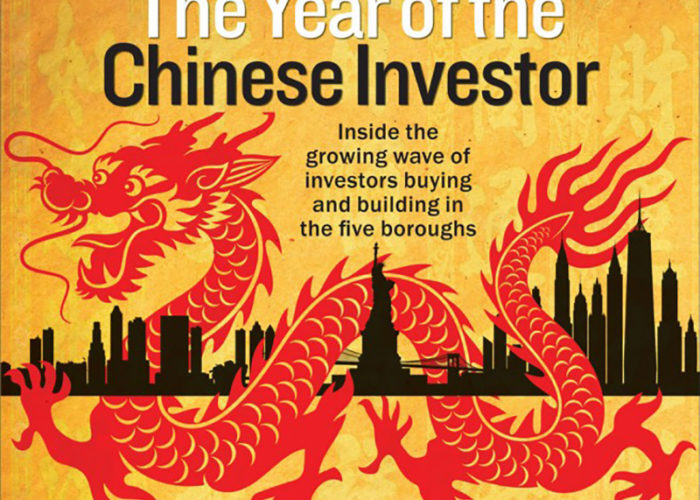EB-5’s gatekeepers: Migration agents
 Last July, a swarm of high-profile guests — including Revlon Chairman Ron Perelman and former Secretary of State Henry Kissinger — gathered to celebrate the launch of a summer tour to China by the National Youth Orchestra of the U.S.
Last July, a swarm of high-profile guests — including Revlon Chairman Ron Perelman and former Secretary of State Henry Kissinger — gathered to celebrate the launch of a summer tour to China by the National Youth Orchestra of the U.S.
Among the high-powered attendees who were invited by China’s New York Consulate General Zhang Qiyue was Linda Mei He. Dressed in a nearly floor-length black gown, Mei He, who along with Carnegie Hall was a major sponsor of the tour, later issued a news release raving about the young musicians and the importance of promoting cultural exchanges between the U.S. and China.
But her involvement in the event was clearly not just about the classical music — it was also a hugely important business-networking tool.
Mei He’s Beijing-based Wailian Overseas Consulting Group, and the hundreds of other so-called “migration agents” that woo investors on the ground in China have been among the biggest profiteers from the EB-5 immigration program. That’s thanks to the massive fees these migration agents charge developers and the regional centers hired to market projects to Chinese nationals. The consultancies can make up to $200,000 on every investor — each of whom is required to contribute a minimum of $500,000 to a project. On a $100 million capital raise, that amounts to a massive $40 million.
But there’s a reason developers and regional centers hire them: They are the gatekeepers, with access to thousands of investors looking to plunk down their cash and get a visa.
For her part, Mei He, who didn’t respond to a request for comment, has marketed investments for major New York City developers such as the Related Companies, Forest City Ratner and Silverstein Properties. And in China, where migration agencies are as common as Duane Reade drug stores are in Manhattan — there are a total of nearly 800 firms in China helping citizens through the emigration process —Wailian is a market leader.
Yet while migration agents have become a key component for getting money from China to New York development projects, sources say they’re also vulnerable to corruption and are largely responsible for EB-5’s bad rap.
That’s because unlike accredited “broker-dealers” in the U.S. — who can also raise EB-5 money but don’t have the same deep connections in China — they fall outside the jurisdiction of the U.S. Securities and Exchange Commission. As a result, the operations of these firms (which are licensed by the Chinese government) are viewed by many as EB-5’s “wild, wild west.”
Some EB-5 insiders say in their thirst for commissions, migration agents sometimes misrepresent projects, making them seem more attractive or less risky than they actually are.
“The problem is now you have agents saying whatever they want to say to try to sell the product to the investors and there are a lot of miscommunications — or what the securities industry would consider fraud,” said Kurt Reuss, an accredited Toronto-based EB-5 broker dealer who has worked with a number of regional centers.
Lost in translation
Until 2008, many migration agents were true immigration centers, simply helping Chinese emigrants get their papers in order for simple visa applications to visit the U.S. or other countries.

Linda Mei He
But as the popularity of the EB-5 program has skyrocketed, these centers became cash cows — bankrolled by U.S. developers hungry for capital. The employees at these migration firms soon began taking on the role of securities dealers, marketing U.S. real estate projects to investors in China in exchange for hefty fees from regional centers.
And some of them have connections to state-owned enterprises, meaning the Chinese government may also be benefitting from the exorbitant fees.
One concern is the question of who should be held responsible if a migration agent embellishes the financial upside of a project.
Some migration agencies, such as Beijing-based Henry Global have already come under fire for misrepresenting projects. In 2012, the agency was accused of purposefully sullying the reputation of a South Dakota-based project after it got into a fee dispute with the regional center representing it. A lawsuit against the agency was eventually dismissed.
The potential for overpromising is great as well. Reuss believes developers and regional centers will eventually be held accountable for inaccurate information — even if they deny knowing exactly how the migration agent peddled it. “If [a migration agent is] taking on the role of marketing your offering, and you benefitted from it, how can you not be held accountable?” he said.
Given how many migration agents exist in China, however, enforcement is far from simple.
“There’s nearly an agency on every corner in China,” said Nuri Katz of Apex Capital, a migration agent based in the West Indies island of Antigua who’s dealt with EB-5 investors from all over the world, including China. “Some of them are pop-ups, and some are bigger franchises. Some of them are doing it properly [but] half of them are not.”
While these agents have to be licensed by Chinese authorities, the barrier for entry is extremely low. In addition, while the agents are free to show off the projects to potential investors at conferences and events in China, they cannot solicit investments on American soil.
Nicholas Mastroianni, president and CEO of the US Immigration Fund — the mega regional center that’s raised funds for Michael Shvo’s 125 Greenwich as well as a slew of other big projects — said the majority of migration agents, outside of a few well-qualified firms, are hiring staffers with zero experience in finance or real estate.
“If you’re at the top of the pyramid, it’s a business,” said Mastroianni, whose website boasts that it has partnerships and promotion agreements with 14 of the top 20 immigration firms in Southern China, including Wailian. “If you’re at the bottom, it’s like everyone is a real estate agent; everyone sells immigration. It’s the mother with an 18-year-old kid who wants a second job.”
Mike Xenick, president and CEO of Invest America Capital Advisors, an accredited broker-dealer based in Tampa, called some of the smaller agencies “glorified travel agents.”
And not all investors are savvy to how migration agents operate.
For instance, investors may not even be aware that the agents they’re dealing with are being paid substantial commissions by regional centers and may instead treat them as impartial advisors. Inexperienced investors can be blinded by the pizazz of agents’ showy presentations, which are often hosted in five-star Beijing hotels.
 Indeed, when Wailian presented Forest City’s Barclays Center project to potential EB-5 investors in 2010, it did so in a spectacular fashion during an investor extravaganza in Beijing. The marketing materials emphasized the Nets stars, set to play at the new arena, rather than the financial breakdown of the project.
Indeed, when Wailian presented Forest City’s Barclays Center project to potential EB-5 investors in 2010, it did so in a spectacular fashion during an investor extravaganza in Beijing. The marketing materials emphasized the Nets stars, set to play at the new arena, rather than the financial breakdown of the project.
Still, it’s easy to see why investors trust the advice of agents such as Mei He, whose company has an exclusive agreement with one of the top Chinese property websites, Juwai.com, China’s equivalent of Zillow, that allows it to market its EB-5 projects.
With 300 employees worldwide and deep connections to U.S. institutions, Mei He is considered an expert in helping wealthy Chinese families secure visas and even in getting their kids into American Ivy League schools. Those connections in the U.S. are strengthened by charitable giving. She has made six-figure donations to nonprofit organizations, including the Eisenhower Foundation for youth development in American inner cities.
Attending an event with the likes of Kissinger and Perelman also gives her a major boost in the eyes of investors.
“Being able to say, ‘I’m friends with this person’ or ‘I know that person’ is gold in China,” said Apex Capital’s Katz. “Seeing you with a Henry Kissinger is a huge deal. To the Chinese, the more influence you have with government, the better off you are.”
The cost of exposure
As competition has ramped up, the fees charged by migration agents have increased substantially over the past couple of years.
Sources told The Real Deal that top migration agents are typically paid by the regional center (or developer), drawing an upfront fee of $50,000 to $75,000 per $500,000 investment they bring in, plus a 3 percent to 8 percent share of the interest over the term of the loan.
By the end of a five-year loan term, some of the highest-paid agents will have raked in close to $200,000 per single investor. That’s double the amount they got paid even two years ago, sources said.
The increasing costs of hiring migration agents also means it’s often financially impractical for regional centers to hire both migration agents and accredited broker-dealers, who can ensure that a project’s marketing complies with U.S. securities regulations.
Sources say the jumping costs are not justified.
“Their job is not that difficult,” said Min Chan, an immigration lawyer with Manhattan-based brokerage City Connections, which also operates a regional center. “They’re shuffling paper, and they’re getting paid a lot of money for it.”
And those fees are increasingly squeezing regional centers. “They’re greedy. They’re very greedy,” said Mastroianni.
In order to keep their costs down, and keep competitors at bay, some regional centers have been secretive about which agents have delivered for them.
Asked which agents her regional center has worked with, Jacqueline Finkelstein-LeBow of the American Immigration Group said it was “proprietary.”
She continued, “I don’t want to give a roadmap of what we’re doing in China. You don’t even want to tell the developers who you’re working with. They think they can do it themselves and they’ll run to China and talk to the same agents.”
Source: https://therealdeal.com/issues_articles/eb-5s-gatekeepers/



